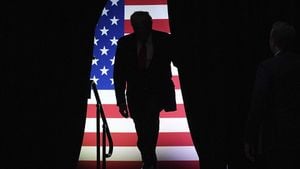Donald Trump has once again claimed the presidency, re-entering the White House with intentions to enforce his vision for America. The recent election witnessed Trump triumph over Democratic challenger Vice President Kamala Harris, securing not just the Electoral College but the popular vote as well. This marks a significant shift from his first term, where skepticism governed the narrative surrounding his presidency. With new expectations and experience, Trump is poised to wield significant power, and his return raises questions about the future of governance and the media's role under his administration.
Trump's emotional rallying cry on election night reverberated with ardent supporters, who filled venues from Florida to Pennsylvania. “America has granted us a powerful mandate,” Trump declared before his supporters, emphasizing his commitment to keeping promises made during his campaign. His focus on policies, especially those targeting immigration reform, suggests an aggressive approach for his upcoming term. The atmosphere surrounding his campaign materialized as one fueled by urgency and passion, driven by perceived failures of the previous administration.
Yet, as supporters celebrated, detractors voiced their fears. Throughout Trump's first term, he often criticized the media, labeling it as “fake news” and the “enemy of the people.” Such contempt is likely to resurface, posing severe challenges for journalists reporting around the next Trump administration. Media watchdogs predict an intense climate of scrutiny and hostility, reminiscent of the tumultuous press relations seen during his last term. Given historical instances of journalist arrests and intimidation, particularly during protests, there are high stakes for the freedoms encumbered by such hostilities.
Already, experts warn of the potential for increased assaults on press freedom should Trump return to power. During his tenure, there was substantial surveillance of journalists, and over 600 physical assaults were documented nationwide against media representatives. Predictions suggest even tighter controls will manifest, with Trump advocating for limits on media access to the Oval Office. Given his history, it wouldn't be surprising if he took steps to limit press credentials exclusively to conservative outlets, potentially sidelining dissenting voices altogether.
Trump's supporters and allies stand resolute, viewing this victory not just as his return to power but as validation of their shared beliefs and frustrations with Washington. The Republican Party, having realigned under Trump's influence, is now devoid of prominent anti-Trump figures, shaping the contours of America's political theatre. This consolidation could lead to unrestrained power for Trump, allowing him to push through the controversial policies he campaigned on, including large-scale deportations and stricter immigration regulations.
Among the first tasks on Trump's agenda is the anticipated continuation of immigration policies. His promises of executing the “largest deportation program” ever are expected to evoke significant unrest, similar to past protests triggered by his earlier executive actions against immigration from predominantly Muslim countries. Historical precedents indicate reporters covering any ensuing protests will likely face heightened dangers, including detention and arrest, as law enforcement agencies become more aggressive.
Following his victory, reactions from the media and political circles have been polarized. Joy Reid of MSNBC expressed her disbelief at the electoral outcome, characterizing the Trump victory as enshrining “an extremist, right-wing, fascist-type government.” Her sentiments echo broader fears within the Democratic Party, where calls for accountability and examination of their loss resound. The disappointment was palpable across social media platforms, with many liberal figures denouncing the outcome as catastrophic.
Post-election analysis points to widespread frustration among Democrats concerning their strategies. Critiques emerged, with social media posts highlighting failures to adequately address voter concerns during the campaign. Some commentators are already blaming internal party divisions and missed opportunities, hinting at the need for restructuring as they look to the future. Given the unyielding nature of the Republican base, calls for unity among Democrats have grown urgent as they face the specter of another politically charged term under Trump.
Hollywood figures and notable celebrities reacted swiftly to the results, expressing despair online as they observed state after state turn red. Prominent commentators like Adam McKay criticized the Democrats’ strategies, calling attention to the disconnection between their messages and the sentiments of everyday Americans. McKay’s comments—highlighting topics like public health and economic concerns—underscore the challenges the Democratic establishment faces moving forward.
While Trump prepares to redefine his presidency, he stands empowered by both electoral success and the backing of his party. Speculation surrounding the potential restructuring of federal agencies under Trump remains strong, such as reforms within the Department of Justice. For many, Trump's past behavior indicates no boundaries when it pertains to opposition. He may seek extensive staff changes, rumors of which suggest purging positions not aligned with his agenda.
Policy implementation discussions have already raised alarms over anticipated aggressive tactics, ranging from unfriendly interactions with the press to refocusing governmental resources on personal and political vendettas. This anxiety extends beyond journalists to federal workers and even popular programs, prompting debates on how the upcoming administration might reshape the norms around governance and accountability.
With Trump returning to the White House, the American political climate is bracing itself for evolutionary shifts. From potential pardons for January 6th rioters to overarching concerns over international policy—especially relations with traditional allies—strategies set forth during Trump's campaign could soon turn from promises to reality. Observers remain alert to the consequences of this election outcome and the potential ramifications for national and global politics.
So as the dust settles post-election, the stage appears set for heightened tension. The supporters, emboldened by Trump's re-election, perceive the changes as correcting what they've labeled as systemic failures, and the Democratic Party finds itself at a crucible of alignment or fragmentation as leaders scramble to recapture the narrative. How these dynamics will play out over the next four years remains uncertain, but the stakes are certainly high.



